Module 10 Unit 2 My mother's cleaning our houses and sweeping away bad luck 课件52张PPT
文档属性
| 名称 | Module 10 Unit 2 My mother's cleaning our houses and sweeping away bad luck 课件52张PPT |  | |
| 格式 | pptx | ||
| 文件大小 | 22.2MB | ||
| 资源类型 | 试卷 | ||
| 版本资源 | 外研版 | ||
| 科目 | 英语 | ||
| 更新时间 | 2021-08-10 08:39:50 | ||
图片预览


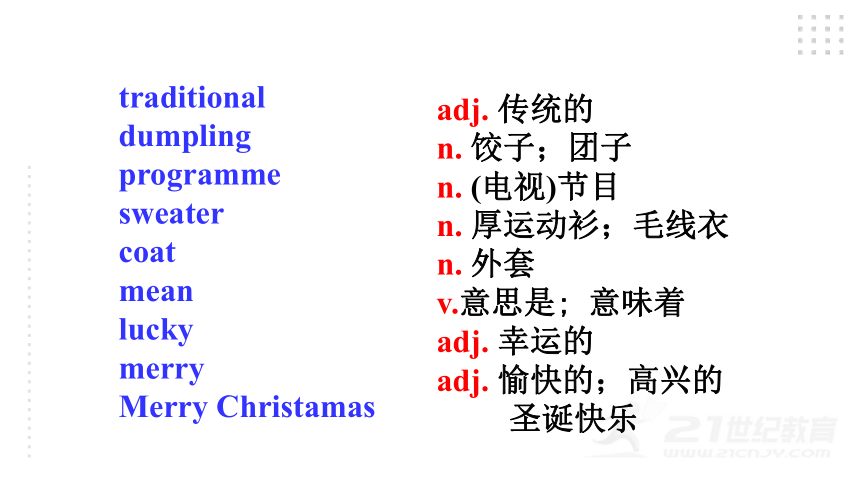
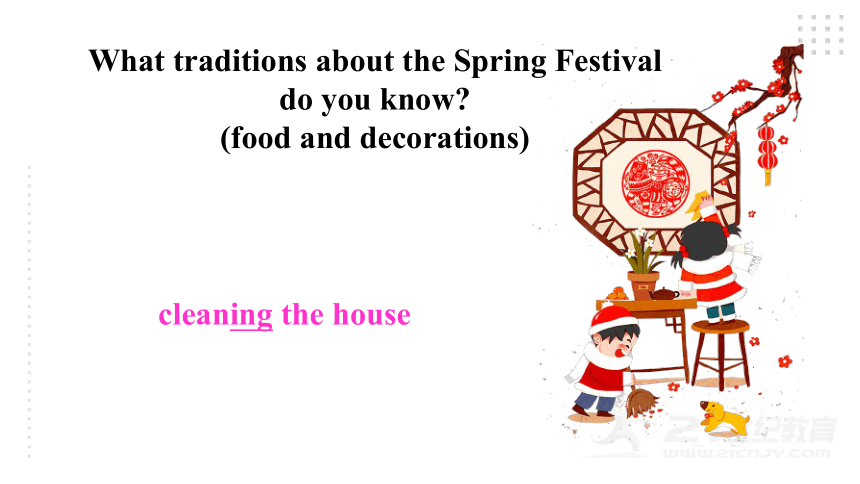
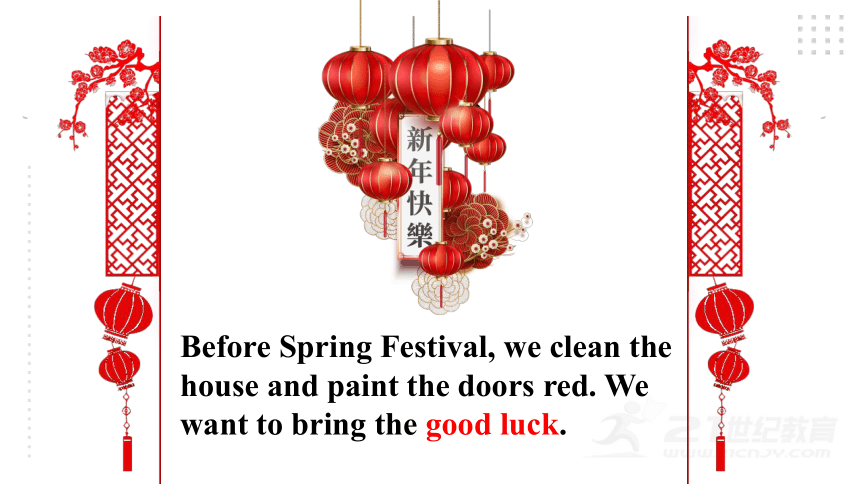
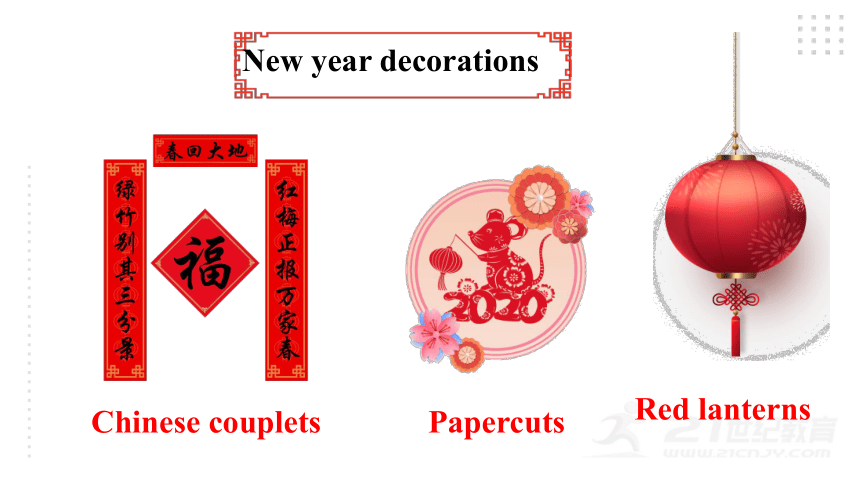
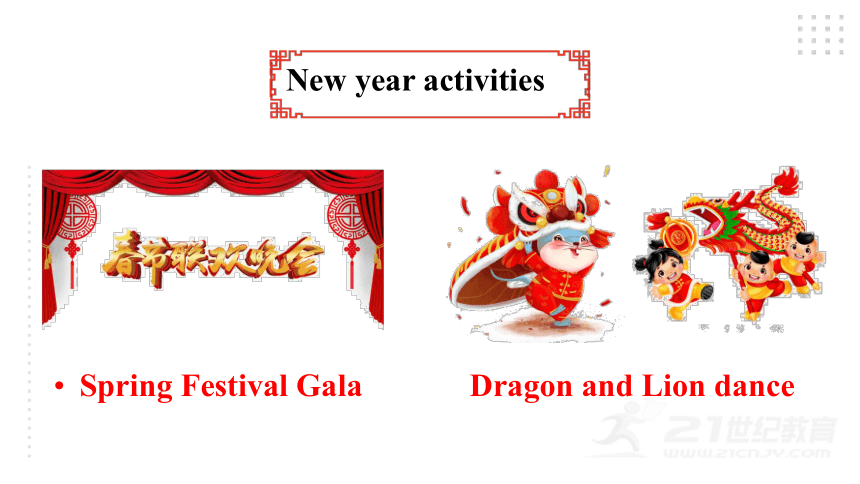
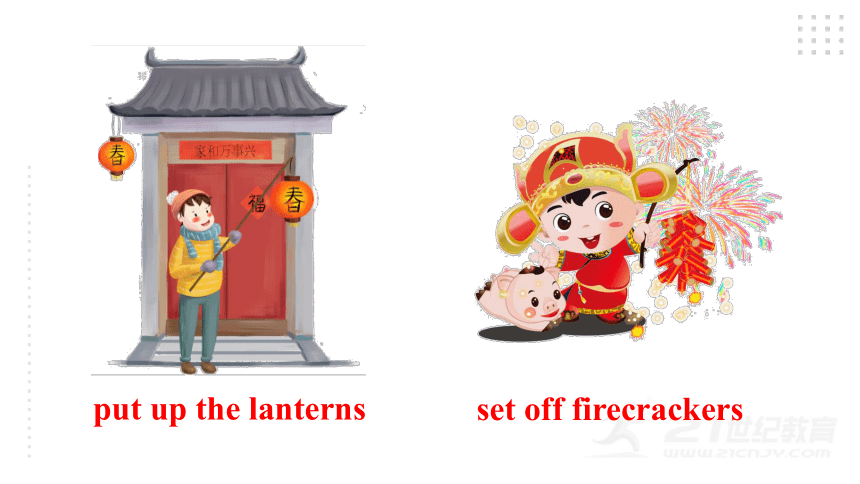
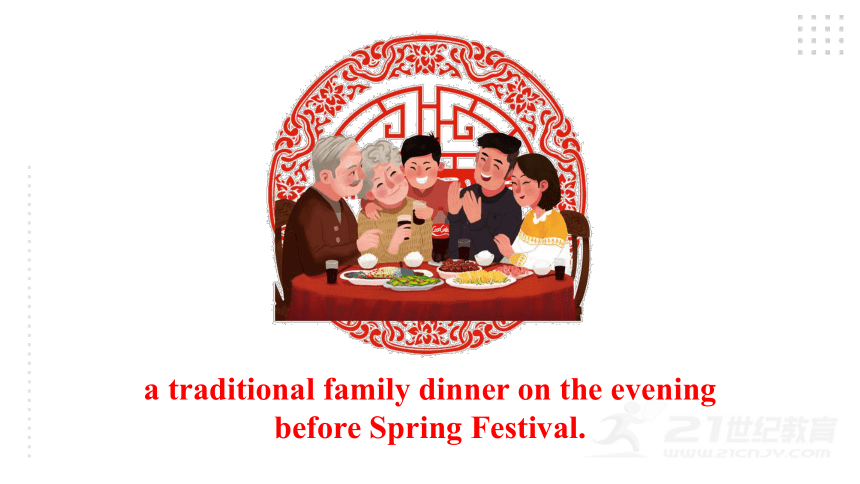
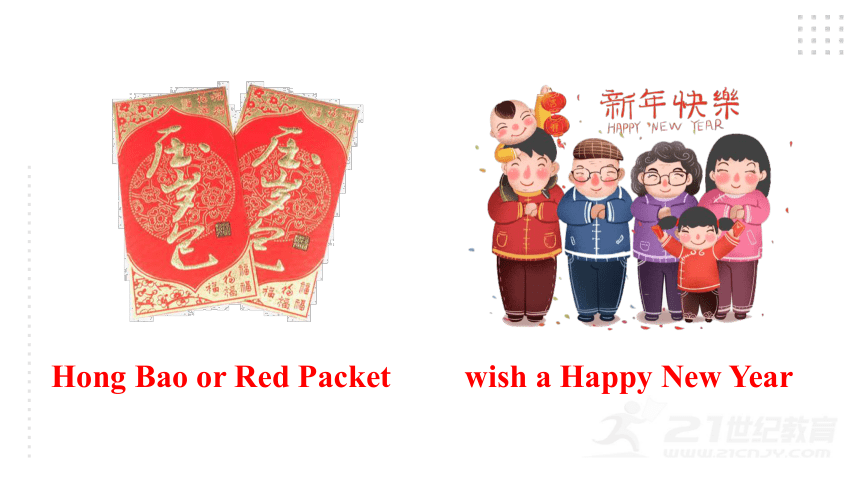
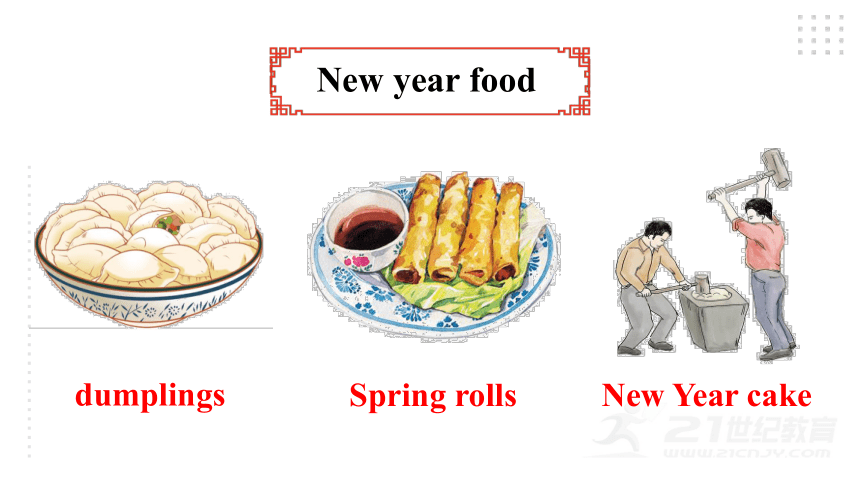
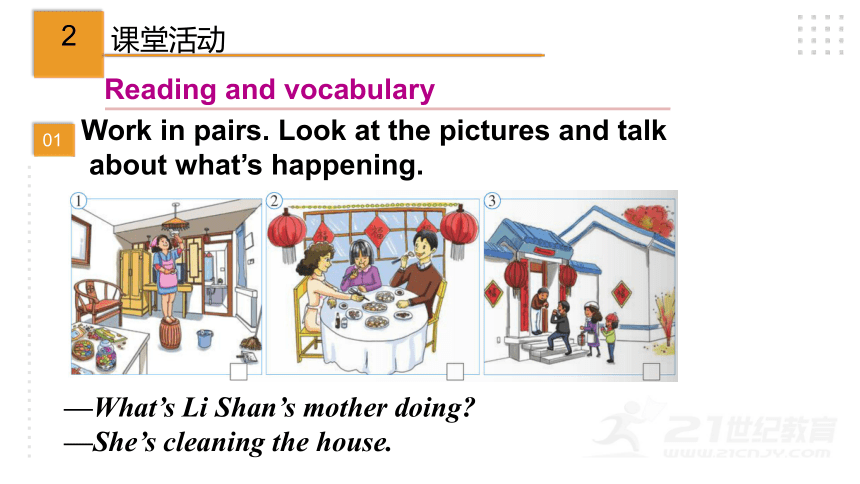
文档简介
英语(外研版)
七年级上册
English
My mother’s cleaning our house and sweeping away bad luck.
Module 10
Spring Festival
Unit 2
Christmas
February
January
before
sweep away
luck
table
celebrate
n. 圣诞节
n. 二月
n. 一月
prep. 在……之前
扫去
n. 运气
n. 桌子
v. 庆祝
Words and expressions
1
课堂导入
traditional
dumpling
programme
sweater
coat
mean
lucky
merry
Merry Christamas
adj. 传统的
n. 饺子;团子
n. (电视)节目
n. 厚运动衫;毛线衣
n. 外套
v.意思是; 意味着
adj. 幸运的
adj. 愉快的;高兴的
圣诞快乐
What traditions about the Spring Festival
do you know?
(food and decorations)
cleaning the house
Before Spring Festival, we clean the house and paint the doors red. We want to bring the good luck.
New year decorations
Chinese couplets
Papercuts
Red lanterns
New year activities
Spring Festival Gala
Dragon and Lion dance
set off firecrackers
put up the lanterns
a traditional family dinner on the evening
before Spring Festival.
Hong Bao or Red Packet
wish a Happy New Year
New year food
dumplings
New Year cake
Spring rolls
Reading and vocabulary
Work in pairs. Look at the pictures and talk
about what’s happening.
—What’s Li Shan’s mother doing?
—She’s cleaning the house.
2
课堂活动
01
We are celebrating Spring Festival with a traditional family dinner on the evening before Spring Festival.
My parents and I are visiting
my uncles and aunts. We are wearing new sweaters and coats.
Listen and answer.
1. When does the Spring Festival usually come?
2. What should mother do before Spring Festival?
3. How are the people celebrating on the Spring Festival evening?
Usually in February, but sometimes in January.
Clean the house, sweep away bad luck and buy lots of food.
Having a traditional family dinner and watching a special programme on TV.
Read the passage and match the main idea with each paragraph.
Paragraph 1
Paragraph A
Paragraph B
Paragraph C
Before the New Year
On New Year’s Day
Introduce the Spring
Festival
On New Year’s Eve
Fast Reading
I’m Li Shan from China. Spring Festival is very important in my country. Like Christmas, it happens every year, but not on the same day. It usually comes
in February, but sometimes it comes in January. I’ve got some photos of it. Have a look at them!
Read the passage and match the paragraphs with the pictures in Activity 1.
02
Here’s the first one! It’s a few days
before Spring Festival. My mother’s
cleaning our house and sweeping away bad luck. Look at the food on the table! We always buy a lot of food before the festival.
A
在……
之前
扫去
Oh, I love this photo. We are celebrating
Spring Festival with a traditional family
dinner on the evening before Spring Festival.
There’s so much delicious food. I am eating
jiaozi — a kind of dumpling. After the dinner,
we usually watch a special programme on TV.
B
庆祝
传统的
如此多的
In this photo, my parents and I are visiting my uncles and aunts. We are wearing new sweaters and coats. I always get a hongbao. It means lucky money.
C
意思是;
意味着
Read the passage and complete the table.
A few day before Spring Festival
On the evening before Spring Festival
On Spring Festival
clean the house
sweep away bad luck
buy a lot of food
celebrate with a dinner
eat jiaozi
visit uncles and aunts
wear new sweaters and coats
watch a special
programme on
TV
get a
hongbao
Complete the passage with the correct form of
the words and expression from the box.
celebrate dumpling few luck mean programme sweep away traditional
We (1) _________ Spring Festival in January or February. A (2) ______ days before Spring Festival we clean our homes and (3) ____________ all the
celebrate
few
sweep away
03
bad (4) _____. On the evening before Spring Festival we have a big family dinner. We eat lots of (5) ___________ food, such as jiaozi – a kind of (6) ____________. We usually watch a special (7) ____________ on television, and parents usually give their children a hongbao. It (8) ________ lucky money.
luck
traditional
dumpling
means
programme
1. It’s a few days before Spring Festival.
a few一些,表示肯定的概念,修饰可数名词复数。few作形容词,表示否定的概念,为“几乎没有”,修饰可数名词复数。
【拓展】few, a few, little, a little这四个词都有
“一点儿”的意思,其用法既有相同
之处, 又有相异之处。
Language points
例:Few people know it.
杯里还有一点牛奶。
很少有人知道此事。
There’s little milk in the glass.
杯里几乎没有牛奶了。
A few people know it.
有一些人知道此事。
There’s a little milk in the glass.
few
“很少;几乎没有”,
表否定含义
修饰_____
名词复数
a few
“几个;有一些”
表肯定含义
little
“很少;几乎没有”,
表否定含义
修饰_______
名词
a little
“一点;一些”,
表肯定含义
可数
不可数
请根据句意选用few, a few, little或a little填空。
1. There are _____ books on the desk. You can borrow one.
2. We have _____ rain this spring. The trees and grass
don’t grow well.
a few
little
3. There are ____ new words in the text, but I don’t understand it.
4. — May I talk with you, Lucy?
— Sure, but only _______ time. I am very busy.
a little
few
2. …with a traditional family dinner on the evening
before Spring Festival.
We decorate the windows with paper cuts.
with prep. 和,带有,用
例:她和我一起去逛街。
She goes shopping with me.
李叔叔是一位留着长胡子的高个头男士。
Uncle Li is a tall man with a long white beard.
我们用剪纸装饰窗户。
3. before prep. 在....之前
1) before+名词
It's a few days before Spring Festival.
2) before+动词-ing
我会在做晚饭前回来。
Our school is before a shop.
I will be back before making dinner.
He always drinks cola before playing basketball.
3) before+完整句子
在你走以前,请给我打电话。
Please call me
before you go.
4. My mother’s cleaning our house and sweeping away bad luck.
sweep away是动词短语,意为“扫去”。如果宾语为名词,可放在away之前或之后;如果宾语为代词,只能放在sweep与away之间。
—Who would like to sweep the flowers away? /
Who would like to sweep away the flowers?
—I’d like to sweep them away.
谁去把这些花打扫了?
我去打扫。
根据汉语意思完成英语句子。
(1)它太脏了。请把它扫走。
It’s too dirty. Please ________________.
(2)请把这些纸扫走。
Please _______________________ ______________________.
sweep it away
sweep away the paper
/ sweep the paper away
5. luck n. 运气
Eg: Good luck (to you)! 祝你好运!
Bad luck! 倒霉
lucky adj. 幸运的
be lucky to do sth 做某事很幸运
Eg: I am lucky to get this job.
unlucky adj. 不幸的
luckily adv. 幸运地
unluckily adj. 不幸地
Unluckily, Steam doesn't pass the eaxm.
Luckily, Joker passes the eaxm.
6. I am eating jiaozi -- a kind of dumpling.
kind可作名词,意为“种,种类”,a kind of意为“一种”。
e.g. Elephants are a kind of animal.
大象是一种动物。
7. mean v. 意思是; 意味着
【语境领悟】
*It means lucky money.
它的意思是压岁钱。
*Giving means receiving.
付出意味着收获。
【自主归纳】
【归纳拓展】
询问“……是……意思”有以下三种句型:
(1)What do/does. . . mean?
(2)What’s the meaning of. . . ?
(3)What do you mean by. . . ?
8. We are celebrating Spring Festival with a traditional family dinner on the evening before Spring Festival.
celebrate作动词,意为“庆祝”。celebrate的名词形式是celebration,意为“庆祝活动;典礼”。
We celebrate our National Day every year.
我们每年庆祝国庆。
When will the celebration start, Dad?
爸爸,庆典什么时候开始?
用括号内所给单词的适当形式填空。
We are ____________(celebrate) Linda’s birthday in the park.
celebrating
Writing
Look at the notes about Christmas in Britain.
Match the notes with the headings.
When you write new words, write them under
headings, in groups or in a word map.
Use pictures and drawings.
Learning to learn
04
a) go shopping for presents
b) have a traditional family dinner
c) open presents on Christmas Day
Getting ready
Traditional things on Christmas Day
Presents
d) put the presents next to the Christmas tree
e) get lots of food ready
f) sing Christmas songs
g) say Merry Christmas to family and friends
h) have a Christmas tree
Getting ready ____________
Presents ____________
Traditional things on Christmas Day
________________________________
a, d, e, h
a, c, d
b, c, f, g, h
Write sentences with the notes in Activity 4.
Join two notes and write one sentence with and.
go shopping for presents; get lots of food ready
They go shopping for presents and they get lots of food ready.
You can leave out the second they.
They go shopping for presents and get lots of food ready.
05
Choose one of the headings in Activity 4 and
write about Christmas in Britain.
Getting ready
People go shopping for presents and get lots of food ready.
put the presents next to the Christmas tree.
have a Christmas tree.
06
3
课堂小结
1.We have read to identify information on the celebration of
Spring Festival.
2. We have learn talk about the celebration of Spring Festival
3.We have learnt some key words and useful expressions
1. 好运 __________ 2. 倒霉 __________
3. 新年快乐 ______________ 4. 一种 __________
5. 在午夜 __________ 6. 在元宵节 ________________
7. 扫去 _____________ 8. 一年到头 _______________
9. 在除夕 ______________________
a kind of
on Spring Festival’s Eve
一、复习下列短语。
good luck
bad luck
Happy New Year
at midnight
at Lantern Festival
all the year round
sweep away
4
课堂训练
二、选择题。
1. Bob, dinner is ready. Please wash your hands ________ you eat.
A. until B. after
C. while D. before
2. Eating dumplings at the Spring Festival is ________ in China.
A. patient B. lucky
C. possible D. traditional
三、完成下列句子。
1. We are ________ (涂漆) the wall together.
2. It ________ (意味着) happening.
3. There are lots of __________ (饺子) on the plate.
4. __________ (每个人) has his own problems.
5. 我们必须马上把树叶扫掉。
We must ___________ the leaves at once.
painting
means
dumplings
Everyone
sweep away
6. 他们用鲜花装饰房间。
They _________ the house ___________.
7. dumplings 是什么意思?
_________ dumplings ______?
8. 我们有好几天不打扫家居。
We ___________ the house ______________.
9. 元宵全年带给我们好运。
Yuanxiao __________________________________.
decorate with flowers
What do mean
don’t clean for a few days
brings us good luck all the year round
四、按要求改写句子。
Is your uncle making lanterns? (否定回答)
_________________________________
2. She’s sweeping the floor at the moment. (一般疑问句)
__________________________________
No, he isn’t.
Is she sweeping the floor at the moment?
3. They’re getting ready for the Lantern Festival.
(划线部分提问)
________________________________________
4. They go shopping for presents. They get lots of
food ready. (用and合成一句话)
________________________________________
________________________________________
What are they getting ready for?
They go shopping for the presents and get
lots of food ready.
https://www.21cnjy.com/help/help_extract.php
七年级上册
English
My mother’s cleaning our house and sweeping away bad luck.
Module 10
Spring Festival
Unit 2
Christmas
February
January
before
sweep away
luck
table
celebrate
n. 圣诞节
n. 二月
n. 一月
prep. 在……之前
扫去
n. 运气
n. 桌子
v. 庆祝
Words and expressions
1
课堂导入
traditional
dumpling
programme
sweater
coat
mean
lucky
merry
Merry Christamas
adj. 传统的
n. 饺子;团子
n. (电视)节目
n. 厚运动衫;毛线衣
n. 外套
v.意思是; 意味着
adj. 幸运的
adj. 愉快的;高兴的
圣诞快乐
What traditions about the Spring Festival
do you know?
(food and decorations)
cleaning the house
Before Spring Festival, we clean the house and paint the doors red. We want to bring the good luck.
New year decorations
Chinese couplets
Papercuts
Red lanterns
New year activities
Spring Festival Gala
Dragon and Lion dance
set off firecrackers
put up the lanterns
a traditional family dinner on the evening
before Spring Festival.
Hong Bao or Red Packet
wish a Happy New Year
New year food
dumplings
New Year cake
Spring rolls
Reading and vocabulary
Work in pairs. Look at the pictures and talk
about what’s happening.
—What’s Li Shan’s mother doing?
—She’s cleaning the house.
2
课堂活动
01
We are celebrating Spring Festival with a traditional family dinner on the evening before Spring Festival.
My parents and I are visiting
my uncles and aunts. We are wearing new sweaters and coats.
Listen and answer.
1. When does the Spring Festival usually come?
2. What should mother do before Spring Festival?
3. How are the people celebrating on the Spring Festival evening?
Usually in February, but sometimes in January.
Clean the house, sweep away bad luck and buy lots of food.
Having a traditional family dinner and watching a special programme on TV.
Read the passage and match the main idea with each paragraph.
Paragraph 1
Paragraph A
Paragraph B
Paragraph C
Before the New Year
On New Year’s Day
Introduce the Spring
Festival
On New Year’s Eve
Fast Reading
I’m Li Shan from China. Spring Festival is very important in my country. Like Christmas, it happens every year, but not on the same day. It usually comes
in February, but sometimes it comes in January. I’ve got some photos of it. Have a look at them!
Read the passage and match the paragraphs with the pictures in Activity 1.
02
Here’s the first one! It’s a few days
before Spring Festival. My mother’s
cleaning our house and sweeping away bad luck. Look at the food on the table! We always buy a lot of food before the festival.
A
在……
之前
扫去
Oh, I love this photo. We are celebrating
Spring Festival with a traditional family
dinner on the evening before Spring Festival.
There’s so much delicious food. I am eating
jiaozi — a kind of dumpling. After the dinner,
we usually watch a special programme on TV.
B
庆祝
传统的
如此多的
In this photo, my parents and I are visiting my uncles and aunts. We are wearing new sweaters and coats. I always get a hongbao. It means lucky money.
C
意思是;
意味着
Read the passage and complete the table.
A few day before Spring Festival
On the evening before Spring Festival
On Spring Festival
clean the house
sweep away bad luck
buy a lot of food
celebrate with a dinner
eat jiaozi
visit uncles and aunts
wear new sweaters and coats
watch a special
programme on
TV
get a
hongbao
Complete the passage with the correct form of
the words and expression from the box.
celebrate dumpling few luck mean programme sweep away traditional
We (1) _________ Spring Festival in January or February. A (2) ______ days before Spring Festival we clean our homes and (3) ____________ all the
celebrate
few
sweep away
03
bad (4) _____. On the evening before Spring Festival we have a big family dinner. We eat lots of (5) ___________ food, such as jiaozi – a kind of (6) ____________. We usually watch a special (7) ____________ on television, and parents usually give their children a hongbao. It (8) ________ lucky money.
luck
traditional
dumpling
means
programme
1. It’s a few days before Spring Festival.
a few一些,表示肯定的概念,修饰可数名词复数。few作形容词,表示否定的概念,为“几乎没有”,修饰可数名词复数。
【拓展】few, a few, little, a little这四个词都有
“一点儿”的意思,其用法既有相同
之处, 又有相异之处。
Language points
例:Few people know it.
杯里还有一点牛奶。
很少有人知道此事。
There’s little milk in the glass.
杯里几乎没有牛奶了。
A few people know it.
有一些人知道此事。
There’s a little milk in the glass.
few
“很少;几乎没有”,
表否定含义
修饰_____
名词复数
a few
“几个;有一些”
表肯定含义
little
“很少;几乎没有”,
表否定含义
修饰_______
名词
a little
“一点;一些”,
表肯定含义
可数
不可数
请根据句意选用few, a few, little或a little填空。
1. There are _____ books on the desk. You can borrow one.
2. We have _____ rain this spring. The trees and grass
don’t grow well.
a few
little
3. There are ____ new words in the text, but I don’t understand it.
4. — May I talk with you, Lucy?
— Sure, but only _______ time. I am very busy.
a little
few
2. …with a traditional family dinner on the evening
before Spring Festival.
We decorate the windows with paper cuts.
with prep. 和,带有,用
例:她和我一起去逛街。
She goes shopping with me.
李叔叔是一位留着长胡子的高个头男士。
Uncle Li is a tall man with a long white beard.
我们用剪纸装饰窗户。
3. before prep. 在....之前
1) before+名词
It's a few days before Spring Festival.
2) before+动词-ing
我会在做晚饭前回来。
Our school is before a shop.
I will be back before making dinner.
He always drinks cola before playing basketball.
3) before+完整句子
在你走以前,请给我打电话。
Please call me
before you go.
4. My mother’s cleaning our house and sweeping away bad luck.
sweep away是动词短语,意为“扫去”。如果宾语为名词,可放在away之前或之后;如果宾语为代词,只能放在sweep与away之间。
—Who would like to sweep the flowers away? /
Who would like to sweep away the flowers?
—I’d like to sweep them away.
谁去把这些花打扫了?
我去打扫。
根据汉语意思完成英语句子。
(1)它太脏了。请把它扫走。
It’s too dirty. Please ________________.
(2)请把这些纸扫走。
Please _______________________ ______________________.
sweep it away
sweep away the paper
/ sweep the paper away
5. luck n. 运气
Eg: Good luck (to you)! 祝你好运!
Bad luck! 倒霉
lucky adj. 幸运的
be lucky to do sth 做某事很幸运
Eg: I am lucky to get this job.
unlucky adj. 不幸的
luckily adv. 幸运地
unluckily adj. 不幸地
Unluckily, Steam doesn't pass the eaxm.
Luckily, Joker passes the eaxm.
6. I am eating jiaozi -- a kind of dumpling.
kind可作名词,意为“种,种类”,a kind of意为“一种”。
e.g. Elephants are a kind of animal.
大象是一种动物。
7. mean v. 意思是; 意味着
【语境领悟】
*It means lucky money.
它的意思是压岁钱。
*Giving means receiving.
付出意味着收获。
【自主归纳】
【归纳拓展】
询问“……是……意思”有以下三种句型:
(1)What do/does. . . mean?
(2)What’s the meaning of. . . ?
(3)What do you mean by. . . ?
8. We are celebrating Spring Festival with a traditional family dinner on the evening before Spring Festival.
celebrate作动词,意为“庆祝”。celebrate的名词形式是celebration,意为“庆祝活动;典礼”。
We celebrate our National Day every year.
我们每年庆祝国庆。
When will the celebration start, Dad?
爸爸,庆典什么时候开始?
用括号内所给单词的适当形式填空。
We are ____________(celebrate) Linda’s birthday in the park.
celebrating
Writing
Look at the notes about Christmas in Britain.
Match the notes with the headings.
When you write new words, write them under
headings, in groups or in a word map.
Use pictures and drawings.
Learning to learn
04
a) go shopping for presents
b) have a traditional family dinner
c) open presents on Christmas Day
Getting ready
Traditional things on Christmas Day
Presents
d) put the presents next to the Christmas tree
e) get lots of food ready
f) sing Christmas songs
g) say Merry Christmas to family and friends
h) have a Christmas tree
Getting ready ____________
Presents ____________
Traditional things on Christmas Day
________________________________
a, d, e, h
a, c, d
b, c, f, g, h
Write sentences with the notes in Activity 4.
Join two notes and write one sentence with and.
go shopping for presents; get lots of food ready
They go shopping for presents and they get lots of food ready.
You can leave out the second they.
They go shopping for presents and get lots of food ready.
05
Choose one of the headings in Activity 4 and
write about Christmas in Britain.
Getting ready
People go shopping for presents and get lots of food ready.
put the presents next to the Christmas tree.
have a Christmas tree.
06
3
课堂小结
1.We have read to identify information on the celebration of
Spring Festival.
2. We have learn talk about the celebration of Spring Festival
3.We have learnt some key words and useful expressions
1. 好运 __________ 2. 倒霉 __________
3. 新年快乐 ______________ 4. 一种 __________
5. 在午夜 __________ 6. 在元宵节 ________________
7. 扫去 _____________ 8. 一年到头 _______________
9. 在除夕 ______________________
a kind of
on Spring Festival’s Eve
一、复习下列短语。
good luck
bad luck
Happy New Year
at midnight
at Lantern Festival
all the year round
sweep away
4
课堂训练
二、选择题。
1. Bob, dinner is ready. Please wash your hands ________ you eat.
A. until B. after
C. while D. before
2. Eating dumplings at the Spring Festival is ________ in China.
A. patient B. lucky
C. possible D. traditional
三、完成下列句子。
1. We are ________ (涂漆) the wall together.
2. It ________ (意味着) happening.
3. There are lots of __________ (饺子) on the plate.
4. __________ (每个人) has his own problems.
5. 我们必须马上把树叶扫掉。
We must ___________ the leaves at once.
painting
means
dumplings
Everyone
sweep away
6. 他们用鲜花装饰房间。
They _________ the house ___________.
7. dumplings 是什么意思?
_________ dumplings ______?
8. 我们有好几天不打扫家居。
We ___________ the house ______________.
9. 元宵全年带给我们好运。
Yuanxiao __________________________________.
decorate with flowers
What do mean
don’t clean for a few days
brings us good luck all the year round
四、按要求改写句子。
Is your uncle making lanterns? (否定回答)
_________________________________
2. She’s sweeping the floor at the moment. (一般疑问句)
__________________________________
No, he isn’t.
Is she sweeping the floor at the moment?
3. They’re getting ready for the Lantern Festival.
(划线部分提问)
________________________________________
4. They go shopping for presents. They get lots of
food ready. (用and合成一句话)
________________________________________
________________________________________
What are they getting ready for?
They go shopping for the presents and get
lots of food ready.
https://www.21cnjy.com/help/help_extract.php
同课章节目录
- Starte
- Module 1 My teacher and my friends
- Module 2 My English lesson
- Module 3 My English book
- Module 4 My everyday life
- Module 1 My classmates
- Unit 1 Nice to meet you.
- Unit 2 I'm Wang Lingling and I'm thirteen years ol
- Unit 3 Language in use.
- Module 2 My family
- Unit 1 Is this your mum?
- Unit 2 These are my parents.
- Unit 3 Language in use.
- Module 3 My school
- Unit 1 There are thirty students in my class.
- Unit 2 The library is on the left of the playgroun
- Unit 3 Language in use.
- Module 4 Healthy food
- Unit 1 We've got lots of apples.
- Unit 2 Is your food and drink healthy?
- Unit 3 Language in use.
- Module 5 My school day
- Unit 1 I love history.
- Unit 2 We start work at nine o'clock.
- Unit 3 Language in use.
- Revision module A
- Module 6 A trip to the zoo
- Unit 1 Does it eat meat?
- Unit 2 The tiger lives in Asia.
- Unit 3 Language in use.
- Module 7 Computers
- Unit 1 How do I write my homework on the computer?
- Unit 2 When do you use a computer?
- Unit 3 Language in use.
- Module 8 Choosing presents
- Unit 1 I always like birthday parties.
- Unit 2 She often goes to concerts.
- Unit 3 Language in use.
- Module 9 People and places
- Unit 1 We're enjoying the school trip a lot.
- Unit 2 They're waiting for buses or trains.
- Unit 3 Language in use.
- Module 10 Spring Festival
- Unit 1 Are you getting ready for Spring Festival?
- Unit 2 My mother's cleaning our houses and sweepin
- Unit 3 Language in use.
- Revision module B
